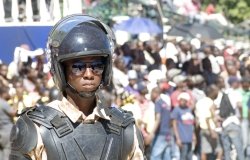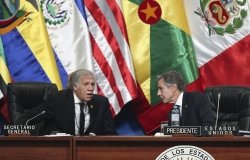The 2007 Elections in Argentina: A Discussion of the Key Economic and Political Issues
Ricardo López Murphy, Founder, RECREAR Party and comments by Riordan Roett, Director, Western Hemisphere Studies, SAIS, The Johns Hopkins University
Overview
Summary of presentation by Ricardo López-Murphy, Founder of RECREAR Argentina Party, with comments by Riordan Roett, Director of Western Hemisphere Studies, SAIS, The Johns Hopkins University
After experiencing one of the worst economic crises in its history in 2002, triggered by a massive debt default that led to political breakdown and urban unrest, Argentina has witnessed a substantial recovery. Although high growth rates and other favorable economic indicators abound, questions about this recovery have been frequently raised, from the sustainability of economic performance to the persistence of unemployment and poverty, as well as rising public insecurity and crime. As Argentines head to the polls in a general election on October 28, Ricardo López Murphy explained his views about the challenges facing the country.
An unusually positive international environment has been a favorable factor in Argentina's recent high rates of economic growth. However, López-Murphy emphasized such growth is only a recovery, and not even a spectacular one, since GDP rates in 2006 were 14% above those in 1997 (before the onset of recession), whereas in Perú and Chile the 2006 GDP figure was 35% above 1997 levels. He stressed that recent Argentine economic performance has excelled on account of a boom in international demand for commodities as well as Brazil's economic transformation, which has sucked in Argentine exports, and not as a result of national policies.
López-Murphy argued that Argentina confronts four major challenges. The first one is institutional: the two pillars of the Argentine political system, a division of powers and federalism, are broken, on account of authority delegation and centralized control over fiscal resources, respectively. Moreover, the quality of education has seriously deteriorated. In this sense some of the more important notions of civic duty and responsibility to be learned at school are not being transmitted to the younger generations. Crime continues to be a problem, in spite of a long-held assumption that a reduction in unemployment would automatically lead to a reduction in criminal activity. Finally, poverty remains high and income distribution skewed, a problem of long origin that has been exacerbated by successive economic crises. Its causes, López Murphy claims, are to be found in the type of investment and education Argentina has been promoting.
Proposals for tackling these issues include a revamping of Argentine institutions to promote pluralism; a decentralization of the educational system to emphasize local solutions, skill development, and output indicators; promoting investment in a way that addresses labor conditions and employment demands; and restructuring the tax system and labor regulation to put emphasis on the development of the formal economy and ease the burden on workers. Besides these proposals, López Murphy noted that a new Argentine government must confront rising inflation and deteriorating infrastructure, while controlling public spending and reestablishing the state's ability to make credible commitments without the constant need for a hegemonic leader.
Riordan Roett addressed the slow slide in Argentina's international position as a symptom of major institutional and social problems of long evolution. Using competitiveness data from the World Economic Forum, Roett evidenced Argentina's precarious rankings (in comparison with other developing countries and emerging markets) in matters such as business environment, property rights, judicial independence, corruption, and education. He reflected on necessary policies to "replace Argentina in globalization", the most pressing of which is a change in education. He equally stressed the need to achieve policy commitment to a long term reform agenda, and reducing polarizing tendencies in Argentina's current socioeconomic landscape, including rural-urban tensions.
José Raúl Perales
Senior Associate, LAP
Hosted By

Latin America Program
The Wilson Center’s prestigious Latin America Program provides non-partisan expertise to a broad community of decision makers in the United States and Latin America on critical policy issues facing the Hemisphere. The Program provides insightful and actionable research for policymakers, private sector leaders, journalists, and public intellectuals in the United States and Latin America. To bridge the gap between scholarship and policy action, it fosters new inquiry, sponsors high-level public and private meetings among multiple stakeholders, and explores policy options to improve outcomes for citizens throughout the Americas. Drawing on the Wilson Center’s strength as the nation’s key non-partisan policy forum, the Program serves as a trusted source of analysis and a vital point of contact between the worlds of scholarship and action. Read more
Thank you for your interest in this event. Please send any feedback or questions to our Events staff.










